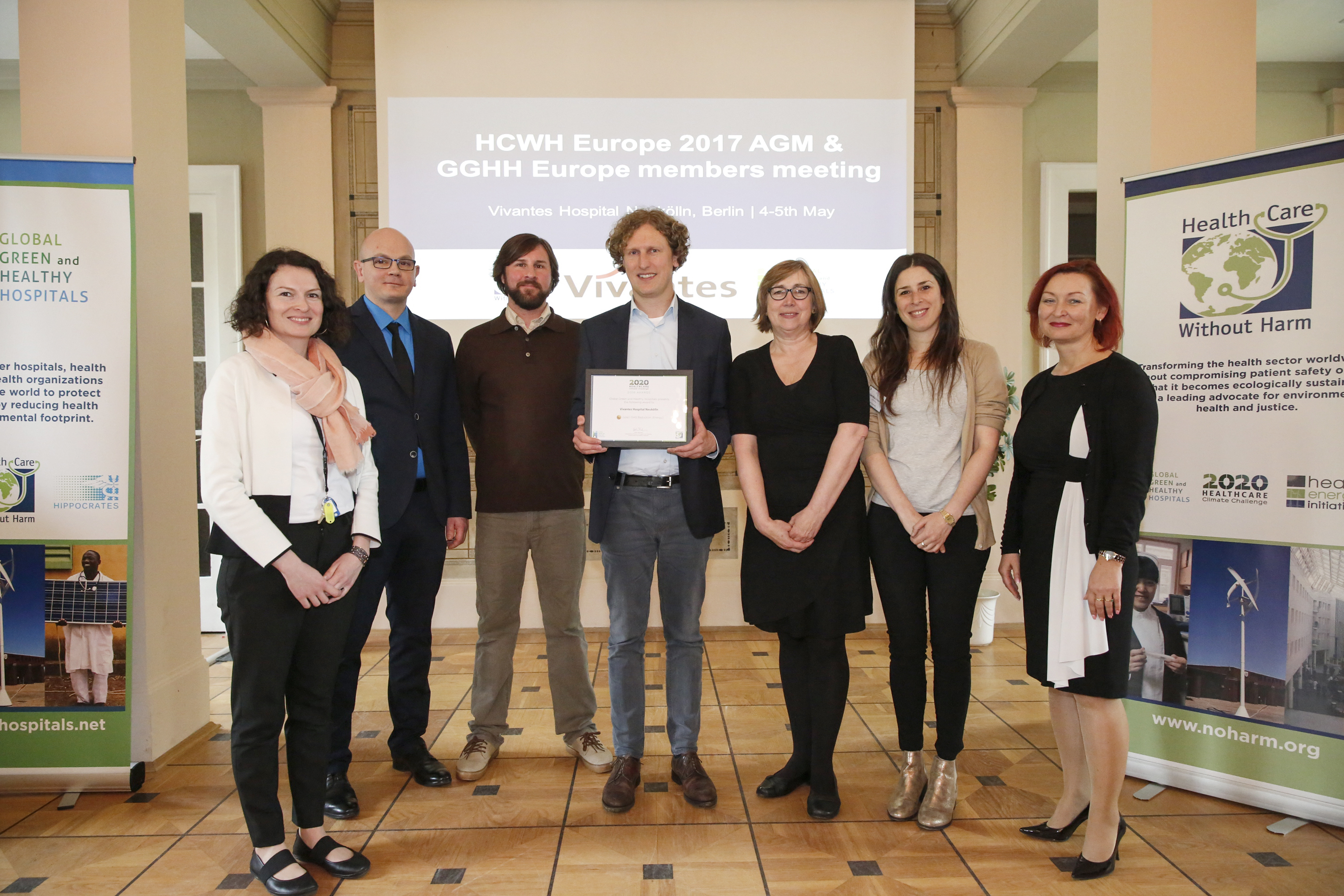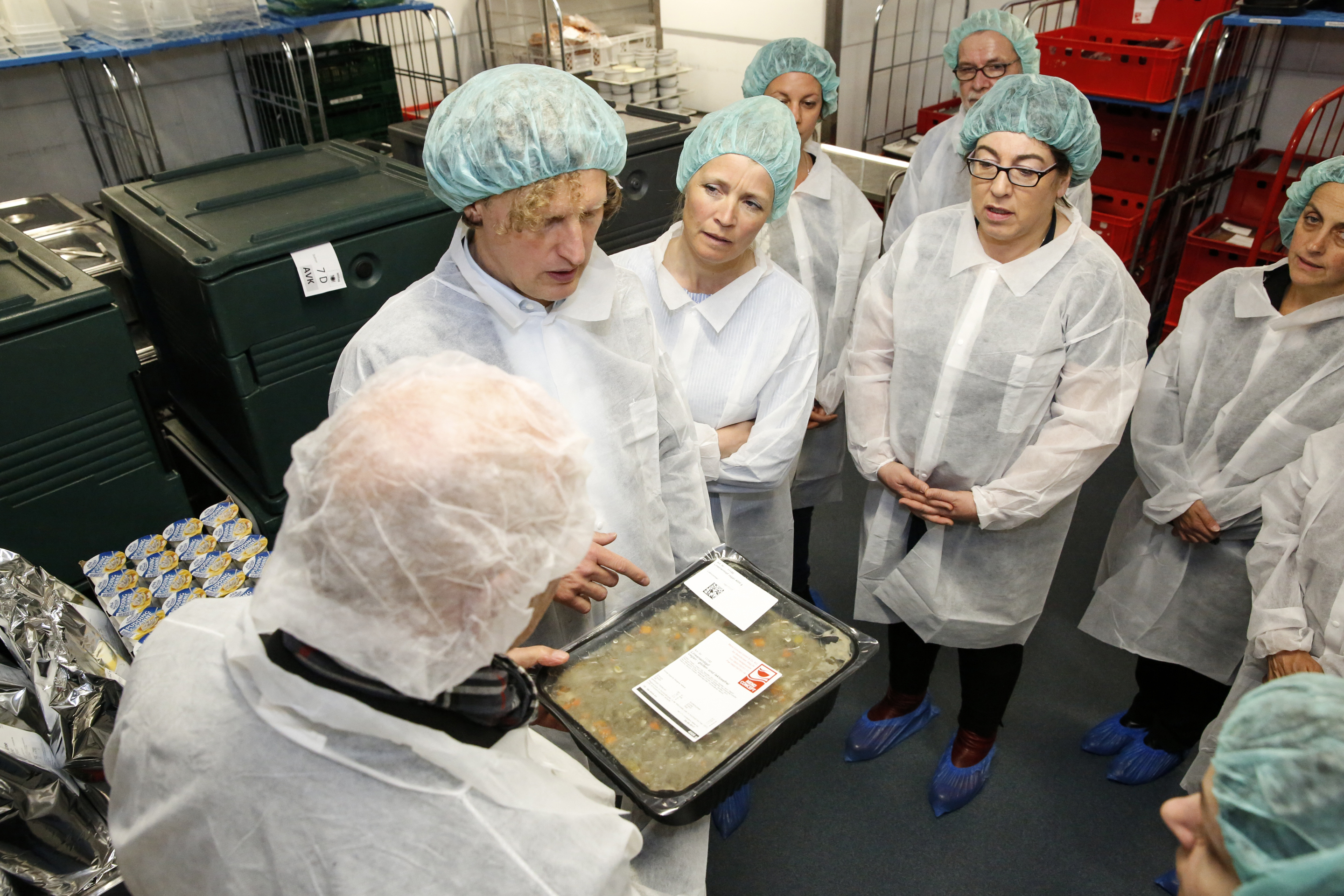2017 HCWH Europe AGM & GGHH Europe members meeting
On 4th and 5th May 2016, the 2017 HCWH Europe Annual General Meeting (AGM) took place at Vivantes Hospital Neukölln, Berlin.
Over 40 people representing HCWH Europe and GGHH members from 12 different countries came together to hear about HCWH Europe’s work over the past year and share experiences in sustainable healthcare from their own organisations and regions.
The event also saw the second meeting of European members of HCWH’s Global Green and Healthy Hospitals (GGHH) network, and members from France, Germany, the UK, and Spain strategised and learned more about the new tools and resources that GGHH offers.
Running parallel to this meeting, HCWH Europe members held the organisation’s AGM, where staff updated members about the work carried out in the past year and members provided feedback on current and future work.
HCWH Europe members also approved the current and previous work plan, as well as the financial report for 2016. Additionally, the organisation’s fundraising strategy was laid out and discussed.
In discussions about reforms to the governance of HCWH Europe, the organisation relieved four existing board members of their position at the board and welcomed four new board members, appointed by a members’ vote.
The outgoing HCWH Europe board members are:
- Hanns M. Moshammer (Austria)
- Polyxeni Nicolopoulou-Stamati (Greece)
- Davide Sgarzi (Italy)
- Michael Wilks (UK)
New HCWH Europe board members appointed:
- Annegret Dickhoff, BUND Berlin e.V., Germany
- Anders Bolmstedt, Region Västra Götaland, Sweden
- Ruth Echeverría, Fundación Alborada, Spain
- Sofia Lindegren, Swedish Doctors for the Environment, Sweden
The afternoon of the first day of the meeting saw presentations from HCWH Europe Executive Director, Anja Leetz, who welcomed all of the participants and introduced GGHH members joining for the afternoon to the work of HCWH Europe.
Next, Josh Karliner introduced the global work of HCWH and spoke of the three major overarching goals of the organisation: to protect public health from climate change, to transform the supply chain, and to build leadership for environmental health. The importance and power of networks was highlighted, and it was hoped that this meeting would establish new networks and strengthen existing collaborations.
Nick Thorp and Alejandra Livschitz then introduced the tools and resources available for GGHH members, including GGHH Connect, an innovative online platform that allows members to connect with leading hospitals, health systems, and experts from around the globe and Hippocrates, the first international platform of its kind designed for the health sector to measure actions towards reducing its environmental footprint.
Christian Dreißigacker, CEO of Vivantes Klinikum Neukölln welcomed HCWH Europe and GGHH members to the meeting and spoke about Vivantes Neukölln’s impressive efforts to reduce their climate footprint, receiving the German eco-label “energy saving hospital” for the Vivantes Klinikum Neukölln.
The remainder of the first day saw presentations from HCWH Europe and GGHH members on the work being done throughout Europe to make healthcare more environmentally friendly.
HCWH Europe also launched a new video in support of the Safer Pharma campaign, which aims to tackle the problem of pharmaceuticals in the environment by raising awareness amongst healthcare professionals, the pharmaceutical industry, and the general public about the steps they can take to reduce the presence of harmful pharmaceuticals in the environment.
The second day of the joint event featured more case studies from members, who presented projects and examples of best practice in the areas of food, procurement, chemicals, climate and energy, and waste/resources.
Grazia Cioci, Deputy Director of HCWH Europe, also spoke about the work of the HCWH Europe office in terms of emerging policy areas for Europe.
See all of the presentation from the 2017 HCWH Europe AGM here
In a special ceremony during the event, HCWH global staff presented Klinikum Neukölln with a Gold Award for their greenhouse gas reduction efforts as part of the 2020 Health Care Climate Challenge. The Challenge provides global recognition for members' leadership role in the movement toward a low carbon health sector and a healthy climate. By using their innovation, ingenuity, investments, and voice, Challenge participants are reducing their climate footprint, developing low-carbon models of care, adapting to stand resilient to a changing climate, and advocating for policies to protect the future health of the planet.

Klinikum Neukölln team receiving the 2020 Health Care Climate Challenge Award © Vivantes Dirk Hasskarl
After lunch, the conference ended with site visits for all of the participants.
Site visit 1: Wenkebach Hospital
At the first of these site visits, the group visited Wenkebach Hospital, which is also part of the Vivantes network, and learned about the energy cogeneration unit there. The staff at the hospital explained how the CHP (combined heat and power) unit worked and how the contract for the unit included energy and money saving measures so that the hospital could reduce emissions and save money over time. The tour concluded with a visit to the social hospice service, which is also on the grounds of the hospital.
Site visit 2: Food distribution centre
In 2012, the Ministry of Food and Agriculture of Germany launched the “Too good for the bin” initiative to reduce food waste among consumers and along the entire supply chain. The Vivantes Hospital group has been part of this initiative for a number of years and this site visit involved a guided tour of the network’s second and largest food distribution centre in South Berlin - where more than 5,000 meals are prepared every day for both patients and employees.

© Vivantes Dirk Hasskarl
The network procures about 20,000 different products from seven main German suppliers or distributors. This great variety of is reflected in the menus at the hospitals. Both patients and employees order three meals per day - breakfast, lunch, and dinner – and can choose exactly want they want according to their preferences and clinical needs.
This facility, which operates from 8am to 10pm, prepares the meals, distributes them to the different wards in hospitals, and takes back the used trays. Waste is sorted into organic, paper, glass, and plastic waste. In addition, plates and cutlery are washed for re-use.
Kitchen staff and ward staff are trained to prevent food waste and educated about the economic and environmental benefits of reducing waste. To this end, the food distribution centre have also introduced an electronic meal ordering system, different portion sizes, and improved aesthetics of meals.
There are still many improvements to be made, but by implementing this initiative, Vivantes has reduced food waste and saved money to be re-invested in purchasing organic products, which currently only account for 5% of the products purchased.
Site visit 3: Vivantes Neukölln
Another group visited the cardiology departments of Klinikum Neukölln. In the hybrid operating theatre, staff showcased a new radiation protection suit. The hospital had found that the previous protection suit (which weighs between 5-10kg) was causing the doctors back pain. Klinikum Neukölln sought out to address this issue for the well being of the staff - and in close collaboration with their procurers - a new, more comfortable product was developed.
On this tour, participants also learned about the new technologies being developed for open-heart surgery at the hospital, which aim to significantly reduce the risks of such an intensive operation, particularly for elderly patients.
The measures being taken by Klinikum Neukolln to prevent AMR amongst patients were also presented. The hospital has developed a prevention strategy that includes a guide for most infectious diseases. This information has been disseminated to all staff in all departments to educate the workforce about prevention procedures. Part of the
strategy includes a system for tracking consumption of antibiotics in patients. As a result of this new strategy being implemented, Klinikum Neukolln has seen a reduction in antibiotic use by 6% in 2016.
HCWH Europe would like to thank all HCWH Europe and GGHH members who participated and contributed to this successful two-day event. Special thanks also to Klinikim Neukölln for their hospitality and showcasing their excellent sustainability work through their site visits.
